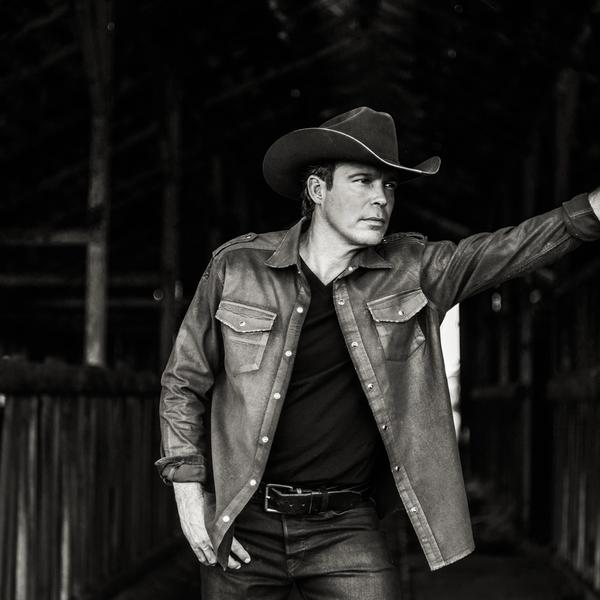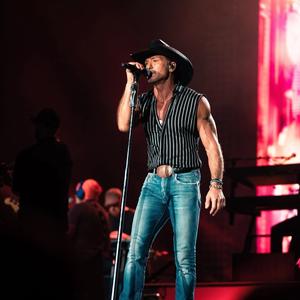




Link copied

Earlier this summer, during one of his first post-pandemic in-person shows, Clay Walker had an unforgettable experience. He looked out from the stage and saw two women - a mother and her young adult daughter - dancing and singing along to the music, hugging each other and smiling. Both of them knew every single word to every song he played, even his newest single, ‘Need a Bar Sometimes’, which came out just this year.
“I’ll never forget that imagery, that moment. They had so many connecting points,” Walker tells Holler. He knew the two fans had different experiences with his songs - the mom might remember listening to his early 90s hits like ‘What’s it To You’ and ‘Live Until I Die’, while her daughter probably wasn’t even born yet when those songs came out. The two fans had different entry points into his music but wound up at the same spot: dancing along together at a show.
“That’s what I live for. I live for seeing somebody living in those songs,” Walker remarks.
Authenticity has been a hallmark of Walker’s career since its early days. From his first foyers into country, the singer brought his identity as a Texan - complete with its persona of unshakeable independence - to the forefront of his music. He has always written songs his way, even when his songwriting style was deemed unfashionable by the established Music City songwriters of the 90s.
Sitting down with Holler, Walker traced those artistic roots all the way to his new album, Texas to Tennessee. With help from collaborators both modern-minded and traditional - including 90s hitmaker David Lee Murphy, who co-wrote one of the album’s songs, and Michael Knox, the producer known for shaping careers such as Jason Aldean’s - Walker says he created an album that speaks more deeply to his identity and roots than anything he’s ever released before.

You co-wrote the title track of Texas to Tennessee with Jennifer Hanson and Mark Nesler. What was the writing process like, and how does the song reflect your journey from growing up in southeast Texas to where you are today?
I was born in Beaumont, Texas, and Mark is from a little town near there. Mark is a little bit older than I am, and he was a local musician and singer-songwriter who had some notoriety. So for me, I had really early inspirations in people like him, and also Mark Chesnutt, Tracy Byrd - they all got record deals and had success in Nashville. It was at least a tangible goal for me: I could see it; it could be done. So getting to write with Mark and Jennifer was really exciting for me. We exchanged a lot of stories, and Jennifer was patient enough to listen to all of it and laugh at some of it. I can’t say enough good things about her. She is a really creative, great songwriter.
The lyrics actually developed out of me and my wife Jessica’s story. You know, we met and lived only in Texas for seven or eight years of our marriage. Then, I started working on albums and things in Tennessee, so we found a place there. We’ve spent a lot of time there, as well as in Texas, so it was just a natural title. But it was a long road from Texas to Tennessee. It was a journey.
Does your identity as a Texan inform your career differently now than it did in the early 90s, when you were first coming up?
I feel like most people who know me as an artist - even other artists - know that I’m a Texan. There’s a persona that comes along with that, that I think is very real. There’s typically an accent that’s there, but it’s really more of an attitude, a very independent one. All the Texans I know are that way. I like that, you know? I like being identified with who I am.
I do think it has always influenced the music I’ve recorded, but none more so than this album. Michael Knox, the producer of this record, is smart - ingenious, in a lot of ways. I wrote or co-wrote every song on the album, and he wanted it that way. He goes, “Man, if I’m gonna produce a record, I want it to be the most authentic Clay Walker record we can make.”
This was your first time working with Michael Knox on a full project, right?
This was my first time working with Michael Knox, and I’m sure it won’t be my last. It was just magic.
You worked with a lot of new co-writers, too, many of whom weren’t yet in the industry in the early 90s when you got started. What did you learn from working with people who had maybe a more modern-minded take on the music?
I think I learned that the possibilities are greater than we ever imagined. And to be honest, it’s better now. For example, in a traditional sense of writing, [songwriters] would always start with the chorus. You know, hook first and try to write backwards from there. I, in particular, hated that. I wanted to start with the first line. Established writers in town at that time just felt like that was completely taboo. They wouldn’t do it. But I wrote most of my first album starting with the first line.
Not that there’s a right way or a wrong way, but I would just say that the possibilities are greater now because of expanding that viewpoint, letting it have a place in the room. The new writers are as good as the traditional ones, they just need someone to write for, someone who wants to cut a song where the lyric is the main piece. It’s not so much about production as it is about the song. And that’s also what was refreshing about these guys.
I was expecting that, “Okay, they’re gonna come in here and they’re gonna think that I need to conform to the world of country music today.” Which is not who I am, and we didn’t do that. We were able to write something that has a modern sound to it, but still has steel guitar on it, and my voice is still there. That was orchestrated by Michael Knox. He directed it beautifully, and everyone fell in line, including me.
I was wondering if you had any concerns about whether your style would be received differently, or whether people might push you towards a certain musical direction. It sounds like that wasn’t the case.
There’s a way to gauge that, and it’s a way that’s actually being looked at now far more seriously than it was in the past. Which is: what do live audiences think? What do they say? They’ve got a voice now, because the record labels and all the facets that are connected to the artist have financial gain from every aspect of what the artist does.
The live piece of it is the most important component. It’s why you do all of it. Why make a record if you’re not going to go out and do it live and have people sing along to it? What the live audience thinks matters, and what I’m seeing now is not only a resurgence of our fans that have always been there, but a youthful growth that is enormous. Half of our audience is younger than 27, 28. The 18-25s are at least half our audience, which is crazy, in a great way. They’re saying, “Hey, I like the way you do it.”
It’s been about 30 years since you had your first country hits. Still, obviously, continuing to have success is not a guarantee. It must be particularly gratifying to see fans at shows connecting with your new material as powerfully as they do with the classic hits.
It is. You know, there’s an important question that we all ask ourselves every day about anything we’re gonna do, and it’s why. Why do it? Why am I doing this interview, or why do I do music? There’s a lot of answers to it, but the most important one is, what is in it for me. And what is in it for me is the joy that I see on people’s faces when they are at one of our concerts. There is a satisfaction in that that you can’t get anywhere else. When I see that, it makes me wanna do it over and over and over, because it brings me great joy.
Texas To Tennessee is out on July 20th via Show Dog Nashville





